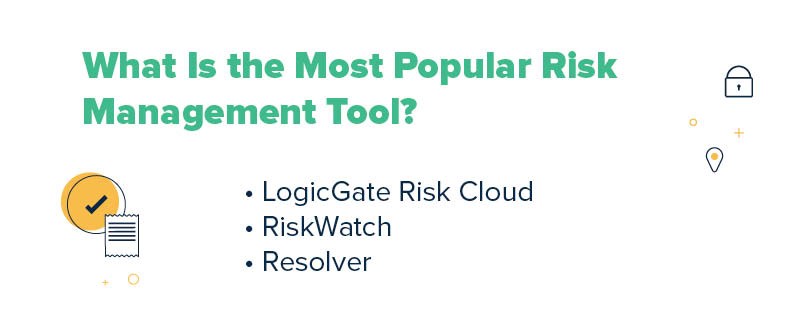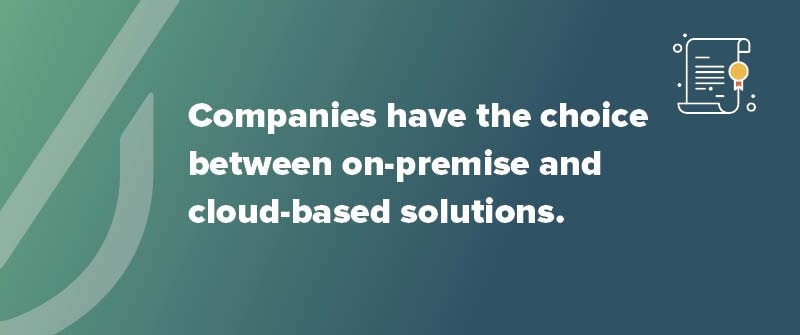
Risk is inherent in every line of business. Mitigating it as much as possible – meaning taking every precaution to ensure that they don’t happen or only lead to small impacts if they do – is crucial.
Risk management processes have become a critical practice for businesses to mitigate risks and remain compliant and financially protected in the modern business landscape. With regulatory standards evolving globally, not every business has the time or on-staff expertise to keep up with compliance standards and risk avoidance strategies.
With the need for risk assessment, third-party risk management, compliance risk management, etc. rising, organizations across industries are increasingly turning to risk management software: digital tools that help them identify, evaluate, and mitigate risks business-wide. These tools also monitor risks and report on risk factors over time, helping businesses proactively manage emerging threats.
Thankfully, there are tons of great risk management platforms on the market today. While we’re not experts on all of them, at myCOI, we help reduce businesses’ risk exposure to costly claims through certificate of insurance services like tracking, managing, and organizing. So, as one of the many excellent platforms that help organizations manage and mitigate their third-party risk, we invite you to follow along in our guide to some of the top-rated risk management software, which sectors use them, how to evaluate platforms, and more.
What Is the Most Popular Risk Management Tool?
As we said, there are many excellent risk management tools. The tops are typically known for their user-friendly platforms or ease of integration into an organization, ability to provide comprehensive coverage, and ability to adapt to business needs across different sectors. A few of the most popular risk management tools, based on risk management software reviews, include:
- LogicGate Risk Cloud: A customizable risk management platform that integrates with various third-party applications and offers various modules tailored to specific risk management needs.
- RiskWatch: Known for its user-friendly design, this platform is popular among financial services and healthcare providers.
- Resolver: Offering a suite of tools that cover things from incident management to regulatory compliance, Resolver is preferred by some enterprise entities that need to scale their risk management efforts.

What Software Do Risk Managers Use for Risk Assessments?
Risk managers’ duties will vary across industries but will involve overseeing operational, financial, compliance, and even strategic risks across a business. Software can help them do their jobs more, create workflows to manage the risk oversight process, and generally plan well to protect the business. In today’s digitally empowered and reliant world, the role of software in everyday risk management is continuing to rise.
Accordingly, there are many kinds of tools that risk managers can use, from risk analysis to risk identification, to streamline their jobs and more effectively manage risk. The best for your business will depend on your industry, your business’s wants and needs, your level of risk tolerance, and more. Here are a few types of software used by risk managers:
- Enterprise Risk Management (ERM) Software. This type of software helps large organizations assess risks across departments at a holistic level, which helps create a unified approach against threats to a company.
- Incident Management Software. This kind of software allows businesses to track incidents and claims in real time, so businesses can manage immediate risks related to safety and security.
- Compliance Management Software. These tools, like ours, help businesses manage their adherence to laws, regulations, and other established standards in order to avoid lawsuits, fines, and other regulatory penalties. myCOI is the best-equipped platform for managing insurance compliance for risk management. We ensure that all contractors, vendors, and hired third parties working with a company maintain adequate insurance coverage to reduce liability exposure and prevent non-compliance. Our software automates the collection, tracking, and validation of insurance certificates to ensure that your company stays protected.
Risk Management Software for Different Sectors
All kinds of companies need risk management strategies. However, different industries face unique challenges, so risk management software must cater to the specific needs of various sectors.
For example, in the financial sector, managing operational, credit, and regulatory risks is critical. Some popular risk management software for banks include platforms like MetricStream, RiskWatch, and SOX.
Small businesses, on the other hand, might prefer more affordable and less robust solutions. Risk management software for small businesses should, at the very least, include basic features like risk assessment and compliance management capabilities.
Many industries, including manufacturing, healthcare, and construction, face specific risks, from supply chain disruptions to safety concerns. That’s why industry-specific risk management solutions exist – to effectively address sector-specific risks. Some of these include Riskonnect for healthcare, Kyriba for financial services, and HammerTech for construction.
Essential Features for Risk Management Tools and Operational Risk Management
As we’ve just explained, risk management software usage and priorities will vary across industries. However, in day-to-day operations, risk managers are increasingly relying on software to continuously monitor vulnerabilities, track emerging risks, and ensure ongoing compliance. An effective risk management strategy should align with the Five Elements of Risk Management.
When evaluating software, a few features that might be considered essential for risk management include:
- Risk assessments and evaluation modules that allow businesses to quantify risk based on key measures such as likelihood and impact.
- Real-time monitoring lets businesses supervise their vendors and assess risks in real-time, ensuring that risks don’t escalate or new ones don’t come out of nowhere.
- Data reporting and analytics capabilities, which again assist with monitoring and help businesses make data-driven decisions.
Which Software Model Is Best Suited for Risk Management?
Now that we’ve discussed risk management software, key features, popular platforms, and how it’s used in different sectors, let’s provide an explanation of different software models.

Choosing the best risk management software for your business isn’t just about picking the right tool. Companies these days have the choice between what are called on-premise and cloud-based solutions.
On-premise solutions
- The more traditional model involves installing software onto local servers.
- Advantages: This model gives businesses full control over their data. Companies with strict data privacy needs, such as those in finance or healthcare, often prefer on-premise solutions to comply with certain regulations.
- Disadvantages: These solutions typically come with higher upfront costs and require in-house maintenance.
Cloud-based solutions
- The newer model is hosted online in the digital “cloud.”
- Advantages: These solutions usually offer lower upfront costs or subscription-based pricing. They are also generally easier to set up and allow business access to regular updates since they can be rolled out digitally. These platforms are ideal for organizations that have a high need for flexibility or want to access their software remotely.
- Disadvantages: Cloud-based solutions can pose data security concerns since they are not hosted in-house.
Choosing the Best Enterprise Risk Management Software
Large enterprises must invest in a robust risk management platform in order to keep track of the various risks across departments and locations. But what criteria should businesses consider when selecting the best platform? Some key features of ERM software include:
- Centralized risk monitoring. Enterprise solutions must be able to integrate data from various departments into a central dashboard so the company can effectively manage all risks.
- Compliance management. Regardless of industry, but especially in higher regulation sectors, ensuring ongoing compliance is critical.
- Customizable risk frameworks. The ability of a platform to adapt risk categories and mitigation strategies to specific business needs can be extremely beneficial. This is especially true for industries like finance and healthcare.
When choosing the best enterprise risk management software for your business, consider your needs for things like scalability, adaptability, integration with other tools, user experience, and vendor support. The ideal tool will support your business’s growth and will adapt to your changing risk appetite and landscape. While there are many great options out there based on your unique needs, some top vendors for enterprise risk management include LogicGate, MetricStream, and SAP GRC.
Free and Open Source Risk Management Tools
For organizations on a budget, free and open-source risk management tools provide a viable alternative. Some popular free risk management options include RiskWatch Open Source and Open Risk. These tools will offer basic risk management features but typically lack advanced functionality like real-time monitoring or incident management.
Free solutions can be great for small companies or teams just getting started with risk management to learn more about compliance and vendor management. However, as organizations grow and risks only become more complex, investing in paid software will provide needed scalability and support.
With so many moving parts and changing regulations, risk management is difficult to do on your own. And with how much there is on the line to lose when something goes wrong – financially, operationally, and reputationally – trust us when we say that risk management is not the area to skimp on.
myCOI: The Best Solution for Your Risk Management Needs
Finding the right risk management software is crucial for staying ahead of risks in today’s fast-paced business environment. Whether you need a solution for compliance, operational risks, or financial risk management, myCOI is a top platform to help streamline your risk management process and ensure that your organization is protected when it comes to insurance compliance and more.
Ready to dive deeper into your company’s security? Book a demo with myCOI today and see how we can transform your risk management strategy.
Need more help with learning about Third-Party Risks? You’re in the right place. Reach out to us today to learn how myCOI can support you.